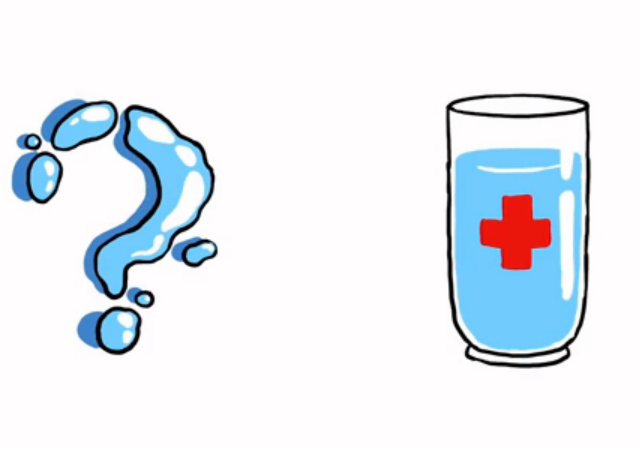Water is virtually everywhere, from soil moisture and ice caps, to the cells inside our own bodies.
水几乎无所不在,从土壤水分及冰帽,到人体内的细胞。
Depending on factors like location, fat index, age, and sex, the average human is between 55-60% water.
依据一些因素,例如所在位置、脂肪、指数、年龄及性别而不同,一般人体内约有 55-60%是水分。
At birth, human babies are even wetter.
刚出生的婴儿甚至更多。
Being 75% water, they are swimmingly similar to fish.
水分占了全身的75%,和鱼的水含量很像。
But their water composition drops to 65% by their first birthday.
然而在周岁前,体内的水分会降至65%。
So what role does water play in our bodies, and how much do we actually need to drink to stay healthy?
那么,水在我们体内扮演什么角色呢?我们该喝多少水来维持健康呢?
The H20 in our bodies works to cushion and lubricate joints,
水在人体内负责缓冲及润滑关节、
regulate temperature, and to nourish the brain and spinal cord.
调节体温、滋养大脑及脊髓。

Water isn't only in our blood. An adult's brain and heart are almost three quarters water.
水不只是存在于血液中,成人的脑及心脏几乎 3/4 是水。
That's roughly equivalent to the amount of moisture in a banana.
大约等同於于1根香蕉的含水量。
Lungs are more similar to an apple at 83%.
肺比较类似苹果,有83%的水。
And even seemingly dry human bones are 31% water.
甚至看起来干燥的骨头都含有31%的水。
If we are essentially made of water, and surrounded by water, why do we still need to drink so much?
若我们主要是由水构成,并且生活周遭都有水,为何我们还需要喝那么多水?
Well, each day we lose two to three liters through our sweat, urine, and bowel movements, and even just from breathing.
我们每天流失 2 至 3 公升的水,藉由排汗、大小便,甚至呼吸而流失。
While these functions are essential to our survival, we need to compensate for the fluid loss.
然而这些功能对我们生存又很重要,所以我们需要弥补流失的体液。
Maintaining a balanced water level is essential to avoid dehydration or over-hydration,
维持体内水分平衡是必要的,以避免脱水或体内水分过多,
both of which can have devastating effects on overall health.
两者皆会对整体健康造成严重的影响。



